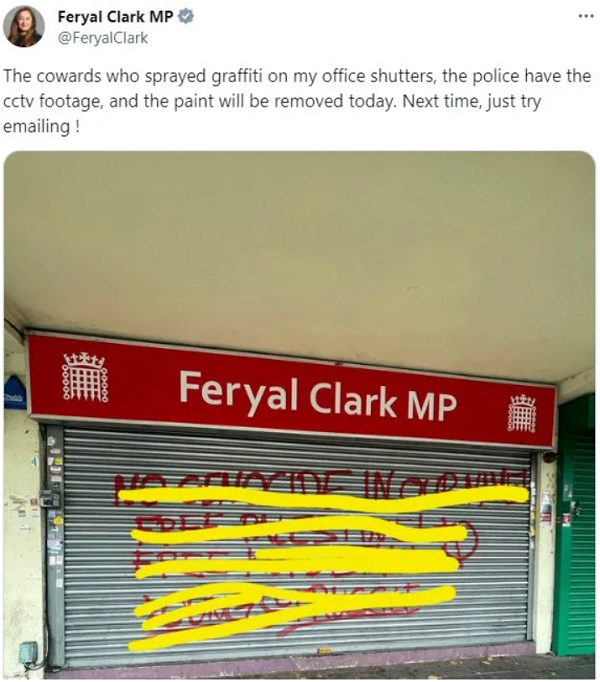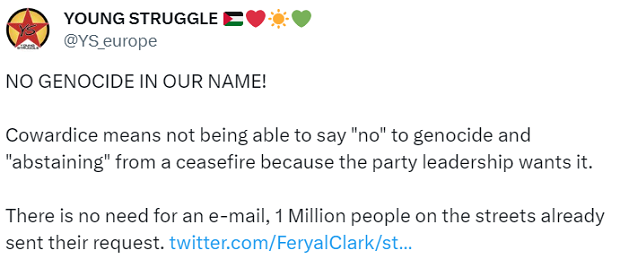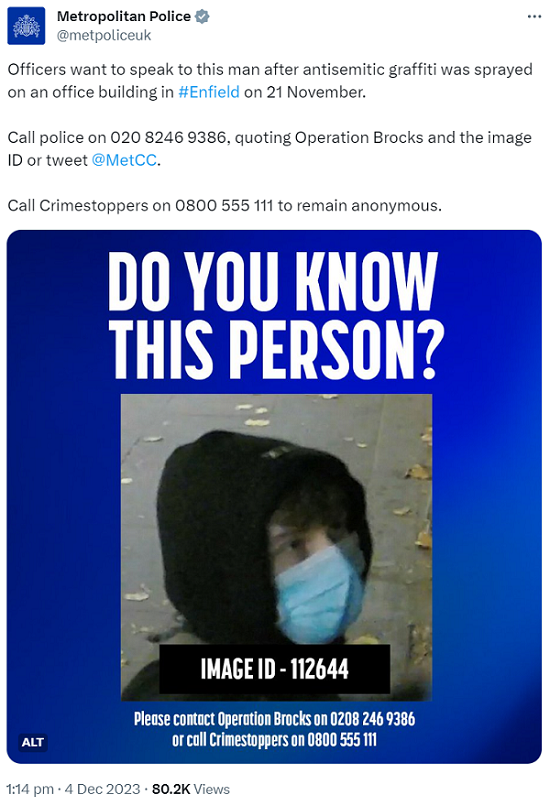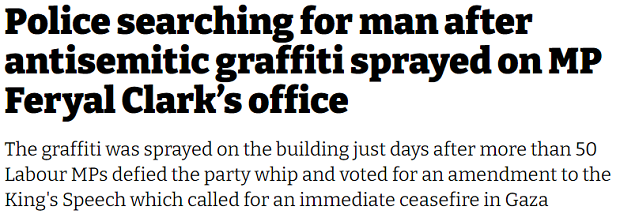Labour MP was intimidated with antisemitic graffiti, police claim
On 22 November, in a subsequently deleted tweet, Labour MP Feryal Clark denounced the spraying of graffiti on the shutters of her constituency office in Enfield the previous night. Addressing the “cowards” responsible, she warned that CCTV footage had been handed to the police with a view to prosecuting them.

In the photo that Clark attached to her tweet the graffiti were partially obscured, but the spray-painted slogans reportedly read: “No Genocide in Our Name”, “Free Palestine”, “Free Kurdistan” and “Young Struggle”.
The last slogan gave an indication of the politics behind the graffiti. It was evidently a reference to a Marxist-Leninist youth group originating in Turkey, who support both the PKK’s struggle for an independent Kurdistan and the Popular Front for the Liberation of Palestine in its resistance to Zionism. Feryal Clark is herself of Kurdish heritage and has expressed solidarity with fellow Kurds facing state repression in Turkey. Her defence of Palestinians against Israeli state terrorism is less impressive, though.
On 15 November she was one of the majority of Labour MPs who went along with Keir Starmer’s contemptible decision not to vote for an SNP amendment to the King’s Speech calling for a ceasefire in Gaza, which understandably provoked outrage from supporters of the Palestinian cause (and indeed from anyone with a shred of humanitarian feeling). Hence the graffiti.
Clark’s tweet led to an angry exchange with Young Struggle, who retorted: “Cowardice means not being able to say ‘no’ to genocide and ‘abstaining’ from a ceasefire because the party leadership wants it.” In response to Clark’s condescending advice that they should try emailing next time, Young Struggle added: “There is no need for an e-mail, 1 Million people on the streets already sent their request.” They also condemned a supposed socialist for “reporting even the smallest protest to the police”.

Clark for her part accused Young Struggle of having “no thought for people who work in that office who had to turn up to a vandalised office” — although, as her opponents pointed out, it was difficult to see how her staff could have been traumatised by a few painted slogans. Clark was also criticised for losing sight of the main issue. “It’s so screwed up that MPs seem more concerned about graffiti on their office shutters than about the genocide that the graffiti is drawing attention to”, Heather Mendick commented.
You might think the police themselves would have more important things to do than pursue the perpetrators of such a minor act of vandalism. But on 4 December the Met issued a news release with an image of an individual presumably taken from the CCTV footage supplied by Clark, and appealed to the public to help identify this dangerous criminal. The officer leading the investigation, PC Louis Blackburne-Maze, was even quoted as stating: “This was a racially aggravated crime. There is no place for hate in London and it’s important that everyone feels safe on our streets.”

Quite how the police had concluded that the graffiti constituted a racially aggravated hate crime was unclear. There was certainly nothing in the actual slogans to indicate any racist motive. But this ridiculous accusation was unquestioningly repeated in press reports. We were treated to headlines such as “Manhunt for vandal who sprayed antisemitic graffiti on MP’s office” (Metro), “Police searching for man after antisemitic graffiti sprayed on MP Feryal Clark’s office” (The i Paper) and “Labour MP’s office vandalised with antisemitic graffiti: Police have released a CCTV still of the suspect” (Jewish Chronicle).

This was no small matter. Spraying graffiti on someone else’s property can be an offence under the Criminal Damage Act 1971, but the actual damage and clean-up costs resulting from a few slogans painted on a metal shutter are obviously negligible. Such low-level cases don’t necessarily have to go to court at all and can be dealt with by the local council issuing a £75 fixed penalty notice under the Clean Neighbourhoods and Environment Act 2005. Racially aggravated criminal damage is a much more serious offence which was introduced in the Crime and Disorder Act 1998, and carries a potential prison sentence of up to fourteen years.
The individual caught by Feryal Clark’s CCTV was wearing a surgical face mask and would have been pretty much impossible to identify. To resolve this problem the Met must have committed considerable time and resources to trawling through CCTV footage from the surrounding area, because on 16 December they issued another news release appealing for information on three further suspects wanted for questioning over the graffiti, all of whom were unmasked.
Significantly, in this new appeal the Met appeared to row back on the earlier assertion that there was a racist motive to the graffiti. Perhaps someone had realised it was highly unlikely that an absurd charge of racially aggravated criminal damage could be made to stick. Instead PC Blackburne-Maze stated: “Elected representatives have an important role to play and they expect to be held to account, but that should not involve feeling unsafe. Neither they nor their staff should have to face targeted attacks and intimidation.”
How exactly did spray-painting political slogans which contained no threating or abusive language whatsoever constitute “targeted attacks and intimidation”? We weren’t told. Nor was there any explanation of the apparent withdrawal of the claim that the action constituted a racist hate crime.
Needless to say, none of this was subjected to any media scrutiny. Not only was the accusation of intimidation uncritically repeated, but the dropping of any reference to antisemitism was ignored. The Telegraph insisted on reminding its readers that the police had “described the graffiti as ‘racially motivated’, adding that there is ‘no place for hate in London and it’s important that everyone feels safe on our streets’”. The Mail reported the Met’s new appeal under the headline “Pictured: Men suspected of spraying anti-Semitic graffiti on Labour MP Feryal Clark’s north London office”.

False accusations of racism and intimidation have of course become the favoured means of discrediting and censoring those expressing solidarity with the Palestinian people. Condemnation of Israel’s genocidal attack on Gaza is equated with hatred of Jews, peaceful protesters are smeared with baseless allegations of threatening behaviour, and the police are pressured to abuse the law in order to suppress political dissent.
The individuals hunted by the Met in connection with the innocuous spray-painting of pro-Palestinian graffiti on Feryal Clark’s office shutters are among the victims of the resulting political hysteria. It would be helpful if Clark dissociated herself from this nonsense, making it clear that she isn’t accusing anyone of either racism or intimidation and doesn’t want to press criminal charges. But don’t hold your breath.
First published on Medium in December 2023